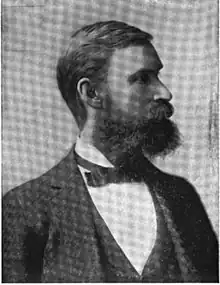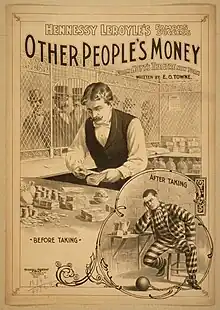Edward Owings Towne
Edward Owings Towne, Jr. (February 19, 1859[1] or February 19, 1860 – March 6, 1938) was an American lawyer in Chicago, who became a writer. He wrote poems, stories, plays, and comedies.[1][2]
Edward Owings Towne | |
|---|---|
 | |
| Born | Edward Owings Towne, Jr. February 19, 1859 or 1860 Pella, Iowa, U.S. |
| Died | March 6, 1938 |
| Occupation | Lawyer, playwright |
| Education | Iowa Central University |
| Notable works | "The Madonna in Chains" |
| Spouse | Sara Johnston Cooper |

.pdf.jpg.webp)
.pdf.jpg.webp)
Early life and education
He was born on either February 19, 1859[1] or February 19, 1860 in Pella, Iowa. His father, Rev. E. O. Towne (died 1874),[3] established Iowa Central University. His father was noted in "Souvenir History of Pella, Iowa (1847–1922)," as a land agent who greeted people arriving by covered wagon.[4]
Towne, Jr. studied at Iowa Central University.[2]
Career
Towne wrote Aphorisms of the Three Threes (1887).[5] He wrote The completion of the spire, and other poems (1889).[6] He wrote the play By Wits Outwitted (1897).[7] He wrote Ideals of an Idol-breaker; A Poem of the New Philosophy (1913).[8] He wrote Philosophy of Jesus; A Narrative of the Life and Teachings of Jesus of Nazareth (1928).[9][10] He wrote Scientific Money, a Cure for Panics and Financial Depressions (1930).[11]
Towne wrote the 1895 play Other People's Money, which was performed at Hoyt's Theatre in New York City the same year.[12][13] He also wrote A Little Drunkardess, A Masked Battery, and Literary Duet By Wits Outwitted,[2] was staged in Cleveland, Ohio in 1893 and was accompanied by A Glimpse of Paradise by Frank S. Pixley.[14][15] Tell Taylor starred in the show. His play For Sweet Charity's Sake won him a thousand dollar prize in a Best One Act play competition circa 1895 and his play By Wits Outwitted ran for at least two years.[16] His story "The Madonna in Chains" was adapted into the 1923 film The Women in Chains.[17]
He was found guilty of conspiring to wreck the Lumbermen's Building and Loan Association in October 1898, and was fined US $1,500 and sentenced to serve an indeterminate sentence time in Joliet Prison (now Joliet Correctional Center).[18]
He died on March 6, 1938.
In 2004 a family in Vista, California found a shoebox full of family memorabilia including photographs, letters, and other documents from E. O. Towne and his family.[19] He corresponded with Charles Eastwick Smith, which is part of the "Charles Eastwick Smith letters from botanists" archives at the Academy of Natural Sciences of Drexel University.[20]
Personal life and family
Towne married Sara Johnston Cooper in 1889.[2] Their son Fenimore Cooper Towne was born c. 1893 and died at the family home in 1918 of sepsis poisoning[21] at the age of 25.[2]
Book publications
- Aphorisms of the Three Threes (1887)[5]
- The Completion of the Spire, and Other Poems (1889)[6]
- By Wits Outwitted (1897)[7]
- Ideals of an Idol-breaker; a Poem of the New Philosophy (1913)[8]
- Philosophy of Jesus; A Narrative of the Life and Teachings of Jesus of Nazareth (1928)[9][10]
- Scientific Money, a Cure for Panics and Financial Depressions (1930)[11]
Screenplay and playwright work
Stage playwright
Filmography
- The Woman in Chains (1923), as the screenplay writer
References
- Dayton, Arthur S. "Edward Owings Towne". College of Law, West Virginia University. Retrieved 2023-04-20.
- The Descendants of William Towne: Who Came to America on Or about 1630 and Settled in Salem, Mass. E. E. Towne. April 20, 1901. ISBN 9780598487834 – via Google Books.
- "Rev. E. O. Towne". Sioux City Journal. August 28, 1874 – via GenealogyTrails.com.
- Murphy, Jeff (1922). Souvenir History of Pella, Iowa (1847–1922). Pella, Iowa: Booster Press – via Iowa Biographies Project.
- Aphorisms of the Three Threes (PDF). Charles H. Kerr and Company. 1887 – via University of Pennsylvania.
- Towne, Edward Owings (1889). The Completion of the Spire and Other Poems. Mid-continent Publishing Company.
- Towne, Edward Owings (1897). By Wits Outwitted.
- Towne, Edward Owings (1913). Ideals of an Idol-breaker ...: A Poem of the New Philosophy ...
- Towne, Edward Owings (1928). The Philosophy of Jesus: A Nar[r]ative of the Life and Teachings of Jesus of Nazareth, Arranged from the Gospels of Matthew, Mark and Luke, as Newly Translated Into Modern English. New Era Book Corporation.
- Towne, Edward Owings (2012-03-01). The Philosophy of Jesus: A Narrative of the Life and Teachings of Jesus of Nazareth. Literary Licensing, LLC. ISBN 978-1-258-26146-7.
- Towne, Edward Owings (1930). Scientific Money, a Cure for Panics and Financial Depressions. New Era Book Corporation.
- "A Comic Chicago Play; " Other People's Money," by Edward Owings Towne. Performed in Hoyt's Theatre Last Night". The New York Times. 1895-08-20. ISSN 0362-4331. Retrieved 2023-04-20.
- "Edward Owings Towne". Broadway Cast & Staff; IBDB.
- "A Play in one act [electronic resource] : A glimpse of paradise by Mr. Frank S. Pixley., by Ont.) Grand Opera House (Hamilton | The Online Books Page". onlinebooks.library.upenn.edu. Retrieved 2023-04-20.
- "The New York Clipper Annual (1893)". Columbia University Libraries. 1893. p. 7. Retrieved 2023-04-20.
- Handy, Moses P (1895). "Literary Chicago". Munsey's Magazine. Vol. 12. Frank A. Munsey & Company. p. 84. Archived from the original on April 21, 2023.
- "The Woman in Chains". www.tcm.com.
- "Found Guilty". True Republican. 1898-10-15. Retrieved 2023-04-20.
- Hyatt, Valari (November 16, 2009). "Family story found in shoebox". Utica Observer Dispatch. Retrieved 2023-04-20.
- "Collection: Charles Eastwick Smith letters from botanists". ArchivesSpace Public Interface, Drexel University.
- "Deaths of the Week". New York Clipper. 1918-01-09. Retrieved 2023-04-20.